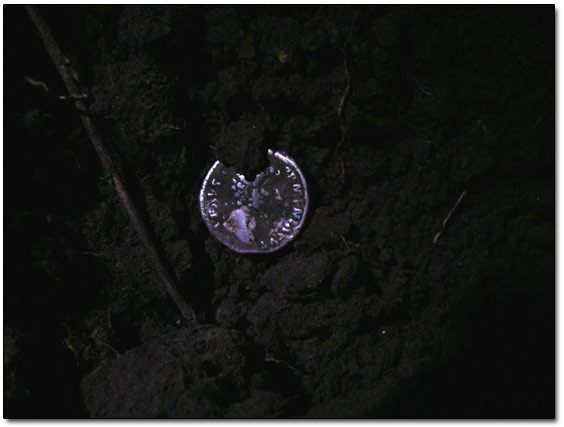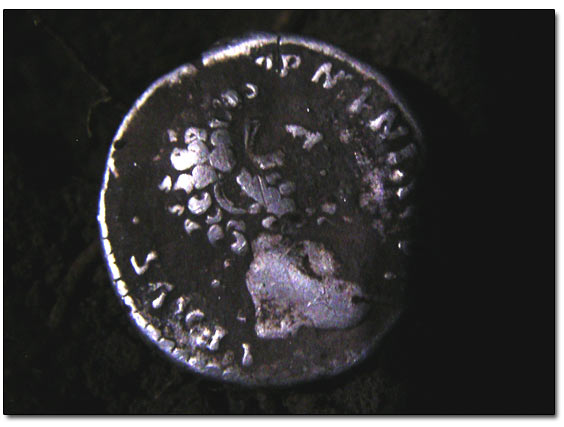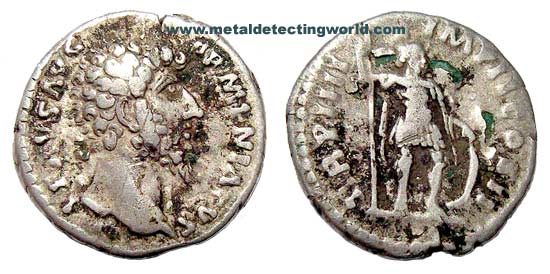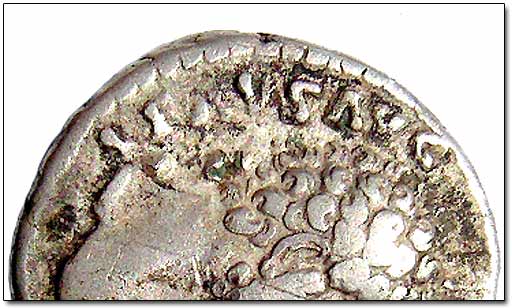Recovery of a Silver Roman Coin Lucius Verus Denarius
Next find was another Roman coin, and it was a silver one!

Unlike the copper coins that usually would be greatly damaged by the soil minerals, the old coins of high silver content would remain in nice condition even after they had been underground for 1840 years!

Lucius Verus Denarius, circa AD 161 - 169

This time, it was easier for me to ID the coin:
The Coin's Legend on Obverse:
VERVS AVG. ARMENIACVS - Laureate head right
The Coin's Legend on Reverse:
TR. P. IIII IMP. II COS.II - Mars standing right, holding spear and shield
AVG. means "augustus" - the same as "caesar" and "emperor."
Coin Details

Brief Historical Facts:
"Lucius Ceionius Commodus, the future Lucius Verus, born December 15 AD 130, was the son of Lucius Aelius Caesar, the Emperor Hadrian's first choice as a successor. Lucius Verus was co-emperor with Marcus Aurelius along with whom he was adopted by Antonius. Marcus transferred the name Verus from himself to his co-emperor in order to establish a family connection.
Being the younger brother, younger partner, and son-in-law to Marcus Aurelius could not have been an easy position in life. Yet this is the role played by Lucius Verus. He was a well educated, active participant in military and political affairs. He had a colorful personality. He is reputed to have been one of the most handsome of emperors whose vanity allowed him to highlight his blond hair with gold dust.
Lucius became accustomed to a life of self-indulgent pleasures of many kinds while in the East during the Parthian War (AD 162 - 166). Once back in Rome, Lucius found a way to continue this lifestyle. Lucius had a tavern built in his house where he spent his post-dinner hours with a wide spectrum of acquaintances to gamble all night, or to eat and drink until he fell asleep and had to be carried to bed. For a change from partying at home, he would dress as a common traveler to visit taverns and brothels, often partaking in drunken brawls, apparently unrecognized. These activities were interspersed and enriched with circuses and contests between gladiators, but Lucius Verus ranked chariot racing above all other "sports." Volucer, his favorite horse, is buried on the Vatican Hill.
As Lucius continued to neglect the obligations of state another conflict erupted, the Germanic War,
this time on the empire's northern perimeter. The war became known as Bellum Germanicum,
lasted from AD 167-180. The older emperor Marcus had undoubtedly learned that
he should neither send Lucius to war alone nor leave him at home to indulge himself
further in the debauchery that had become his unsupervised lifestyle. Marcus persuaded
the Senate that both he and Lucius were needed at the battle front.
As Marcus
and Lucius were returning home in 169, Lucius suddenly became ill. Three days
later, at the age of 38, Lucius Verus was dead. Marcus provided ample support
for the deceased emperor's family and freed men. Imperator Lucius Verus was deified
under the name of Divus Verus."